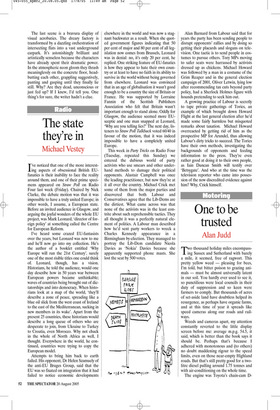The state they’re in
Michael Vestey
I’ve noticed that one of the more interesting aspects of obsessional British EUfanatics is their inability to face the reality around them, and one of their prime specimens appeared on Straw Poll on Radio Four last week (Friday). Chaired by Nick Clarke, the debate motion was that it was impossible to have a truly united Europe; in other words, I assume, a European state. Before an invited audience in Glasgow, and arguing the joyful wonders of the whole EU project, was Mark Leonard, ‘director of foreign policy’ at something called the Centre for European Reform.
I’ve heard some crazed EU-fantasists over the years, but Leonard was new to me and he’ll now go into my collection. He’s the author of a booklet entitled ‘Why Europe will run the 21st Century’, surely one of the most risible titles one could think of. Leonard, though, has a vision. Historians, he told the audience, would one day describe how in 50 years war between European powers became unthinkable; waves of countries being brought out of dictatorships and into democracy. When historians look at a map of the world, ‘they’ll describe a zone of peace, spreading like a blue oil slick from the west coast of Ireland to the east of the Mediterranean, sucking in new members in its wake’. Apart from the present 25 countries, these historians would describe a long queue of others who are desperate to join, from Ukraine to Turkey to Croatia, even Morocco. Why not chuck in the whole of North Africa as well, I thought. Everywhere in the world, he continued, countries were trying to copy the European model.
Attempts to bring him back to earth failed. His opponent, Dr Helen Szamuely of the anti-EU Bruges Group, said that the EU was so fixated on integration that it had failed to notice economic developments elsewhere in the world and was now a stagnant backwater as a result. When she quoted government figures indicating that 50 per cent of major and 80 per cent of all legislation now comes from Brussels, Leonard was in denial: no, it’s only 20 per cent, he replied. One striking feature of EU-fanatics is how they appear to hate their own country or at least to have no faith in its ability to survive in the world without being governed from elsewhere. Leonard was convinced that in an age of globalisation it wasn’t good enough to be a country the size of Britain or France. He was supported by Lorraine Fannin of the Scottish Publishers Association who felt that Britain wasn’t important enough to stand alone. Oddly for Glasgow, the audience seemed more EUsceptic and one man snapped at Leonard, ‘Why are you telling lies?’ The next day, listeners to Straw Poll Talkback voted 60/40 in favour of the motion, that it was indeed impossible to have a completely united Europe.
This week in Party Tricks on Radio Four (Tuesday, repeated this Sunday) we entered the dubious world of party activists who use smears and other underhand methods to damage their political opponents. Alastair Campbell was once the leading practitioner, but now they’re at it all over the country. Michael Crick met some of them from the major parties and discovered that both Labour and Conservatives agree that the Lib-Dems are the dirtiest. What came across was that none of the activists was in the least contrite about such reprehensible tactics. They all thought it was a perfectly natural element of politics. A Labour man described how he’d sent party workers to wreck a Charles Kennedy appearance in a Birmingham by-election. They managed to portray the Lib-Dem candidate Nicola Davies as ‘Nokia’ Davies because she apparently supported phone masts. She lost the seat by 500 votes. Alan Barnard from Labour said that for years the party has been sending people to disrupt opponents’ rallies and by doing so getting their placards and slogans on television. One tactic is to send people in costumes to pursue others. Tory MPs moving to safer seats were harrassed by activists dressed up as chickens. Michael Howard was followed by a man in a costume of the Grim Reaper and in the general election campaign of 2001, Oliver Letwin, lying low after recommending tax cuts beyond party policy, had a Sherlock Holmes figure with hounds pretending to seek him out.
A growing practice of Labour is secretly to tape private gatherings of Tories, an example of which brought down Howard Flight at the last general election after he’d made some fairly harmless but misquoted remarks about taxation. Michael Howard overreacted by getting rid of him as the prospective MP for Arundel, thus allowing Labour’s dirty tricks to succeed. The Tories have their own methods, investigating the backgrounds of opponents and feeding information to the press. They’re even rather good at doing it to their own people, as Iain Duncan Smith will testify over ‘Betsygate’. And who at the time was the television reporter who came into possession of the now discredited evidence against him? Why, Crick himself.

















































 Previous page
Previous page